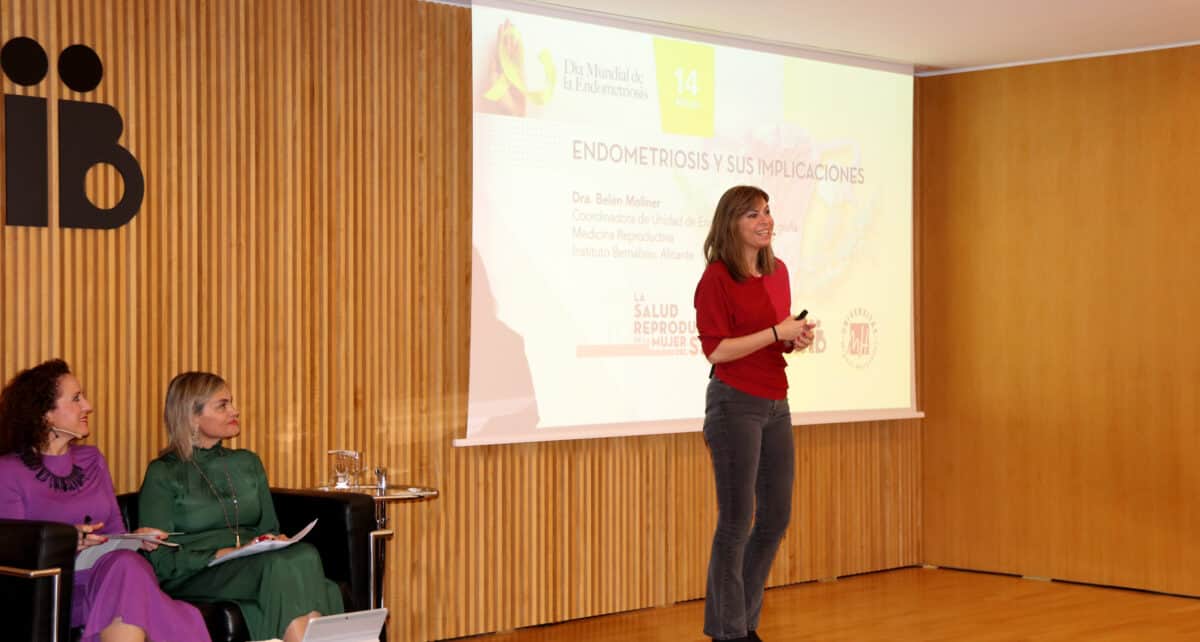“30% of detected endometriosis cases are diagnosed chilst performing reproduction treatments”
March, 16th 2023

One in 10 women of childbearing age suffers from this chronic disease that usually causes infertility and “it is often in the consultation room when women discover they suffer from it”, explains Dr Belen Moliner of Instituto Bernabeu.
“Thirty percent of endometriosis is detected during reproductive treatment”. This is how Dr. Belen Moliner, specialist in ultrasound scans and endometriosis at Instituto Bernabeu, highlights the delay in diagnosing this disease, which is often at the fertility clinic. The inability to become pregnant is another of the endometriosis symptoms and it is often in consultation where the patient, who has suffered for years from other associated symptoms, discovers what is now preventing her from becoming pregnant.
This March 14th is the World Endometriosis Day, a chronic disease characterised by the presence of the inside tissue lining the uterus outside the endometrium and which can be located in all organs except the pancreas. In many cases, it is detected in the lung, bladder or even the nose, causing bleeding.
The specialist recognises that patients with endometriosis are at greater risk of infertility than other patients; undergoing reproductive medicine treatment to become mothers can disrupt the disease, as during treatment they must stop taking contraceptives regulating their hormones and can worsen their endometriosis. “Oocyte vitrification should be recommended to these patients to raise awareness of the need for early diagnosis and care of infertility as a symptom. Right now, vitrification is the only tool to alleviate these effects on fertility in the future,” explains Dr Moliner.
One in 10 women suffers from it
The estimate is that some 176 million women suffer from endometriosis worldwide. “One in 10 women of childbearing age has endometriosis, but I am convinced that there are many more because there are many women who have not been diagnosed and others who suffer it in silence as if it were something normal,” says Dr Moliner. In addition to period discomfort, there are other common symptoms such as pain during intercourse and gastrointestinal symptoms leading to bloating. “Sometimes it affects the bladder, the patient has a continuous feeling of irritation as if she has an infection and, after urine cultures, antibiotics are given, which are likely to make the situation worse. In addition, women often have migraines before their period. This symptom is important because the treatment for endometriosis is hormonal and this exacerbates the intensity of the migraines. It also causes fatigue, insomnia, depression…”, says the specialist.
For the expert in 3D ultrasound at Instituto Bernabeu, it is essential to avoid delaying diagnosis. “We have to focus on that,” she explains, given that, at present, it takes a woman with endometriosis between 7 and 10 years for a doctor to give a name to what is wrong with her. And during this period there are cases of real despair because it generates a lot of incomprehension in the affected person’s environment: “we shouldn’t go to certain lengths”, acknowledges the Instituto Bernabeu specialist, “I recently diagnosed a girl in consultation and she started to cry. She told me she thought she was crazy. But she was not crazy, her pain was real, it was endometriosis located in the intestine”.
“The period shouldn’t have to hurt”
Dr Moliner’s idea is that menstruation should not hurt. Pain normalisation throughout history has been very detrimental to the early detection of this disease.
In a recent study involving girls and young women aged 12 to 25 years, frequent symptoms are gastrointestinal problems, abdominal distension, food intolerance, bloating. And they are often mistaken for digestive problems. “Many women with endometriosis, as they do not attach importance to period pain, go to the digestive tract to see what is wrong, because there is something that doesn’t agree with them,” adds Dr Moliner. Some patients even eliminate lactose and gluten from their diet, thinking they are intolerant.
